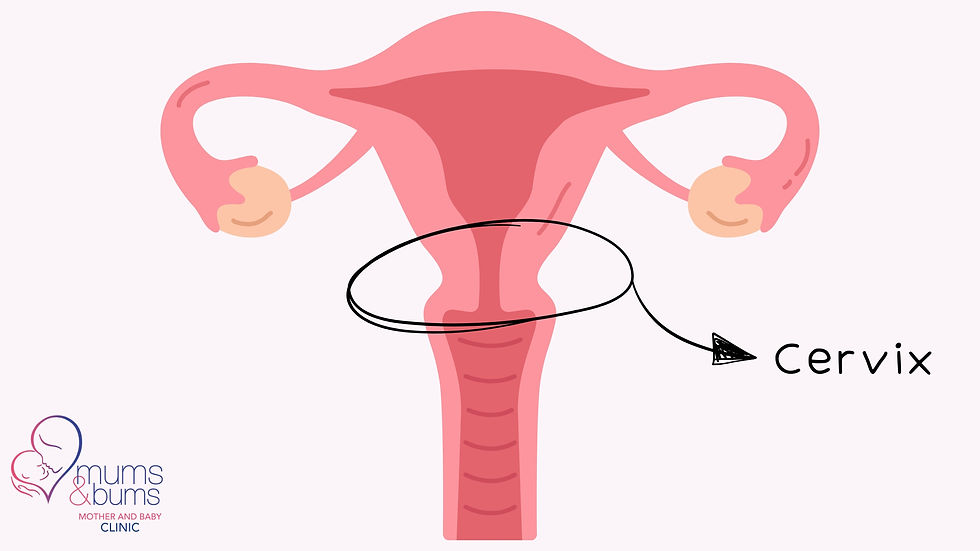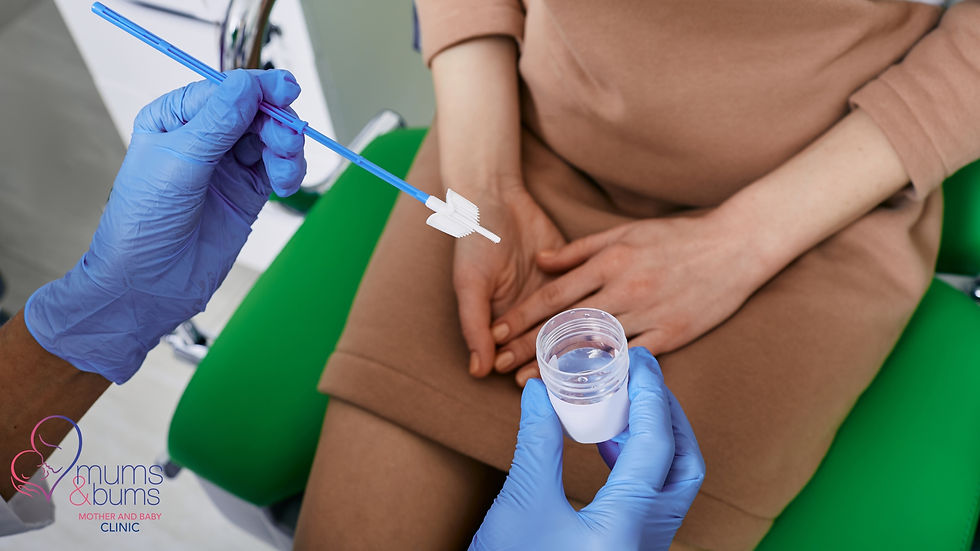Pap Smears in South Africa: What Every Woman Needs to Know
- Samantha Pieterse
- Nov 18, 2024
- 5 min read
Updated: 4 days ago
As moms, we’re good at remembering the baby check-ups and the birthday party gifts. But our own health appointments often end up right at the bottom of our list. But there's one important checkup that shouldn’t fall off the radar, and that is your yearly pap smear.
A Pap smear test is a quick, simple screening that can detect early signs of cervical cancer, giving you the chance to treat anything abnormal before it becomes something serious. And in South Africa, where cervical cancer is one of the leading cancers affecting women, regular Pap tests are one of the best ways to protect yourself.

What is a Pap Smear?
A Pap smear (also known as a Pap test) is a procedure where we collect cells from the cervix, the lower, narrow end of the uterus that opens into the vagina. The reason why we do this test is to detect any abnormal cells that could indicate cervical cancer or precancerous conditions. Early detection through regular
Pap smears have really worked to reduce the incidence of fatal cervical cancer worldwide over the past few decades because early detection comes with early intervention (or treatment).
Why are Pap Smears So Important?
Pap smears save lives by helping detect changes in cervical cells before they become cancerous. According to the World Health Organization, routine cervical screening is one of the most effective cancer prevention strategies.
In South Africa, access to Pap smear screening is improving, and many private clinics (like ours!) make the process easy, gentle, and comfortable. If you’re between 21 and 65, these tests should absolutely be part of your regular health checks.

What to Expect During a Pap Smear Appointment
Understanding the procedure can help to reduce your anxiety. Here's what will usually happens:
Preparation: You'll be asked to undress from the waist down and lie on an exam table. Our clinic doesn’t use stirrups; we’ll ask you to bend your legs at the knees.
Speculum Insertion: We will gently insert a speculum into the vagina to widen it so that we have a clear view of the cervix.
Cell Collection: Once we can see the cervix, we collect a sample of cervical cells using a small, soft brush.
Completion: The speculum is removed, and the cell sample is sent to the laboratory for analysis.
The procedure is quick, lasting only a few minutes from start to end, and while it may cause some discomfort, it shouldn't be painful.
How Can You Prepare for Your Pap Smear?
There's no need for fancy prep. This is one appointment where showing up as yourself is more than enough. But here are a few tips to help your results be as accurate as possible:
There’s No Need to Go All Out on Grooming: Let’s start with a myth-buster: you do not need to shave, wax, or do anything special to your pubic hair. We have seen it all; the focus is on your health, not your grooming habits. So, come as you are.
Avoid Sexual Intercourse for 24-48 Hours Beforehand: Having sex can wash away or mask cells we need to collect, which could potentially affect your results.
Don’t Use Any Vaginal Products: Please don’t douche, insert vaginal creams, use a tampon, or place anything else in the vagina that could interfere with the results for at least 48 hours.
Communicate Your Concerns: If you feel anxious or uncomfortable or have specific questions about the process, let us know. We can guide you through each step and help you feel more comfortable.
Relax (Easier Said Than Done): Taking deep breaths and reminding yourself that this quick test is a way to care for yourself can help you feel a little less stressed about your appointment. Remember: it’s just a quick stop in your day, and you’re taking an important step for your health.
Pap smears require simple prep. Bring some comfy clothes for afterward and maybe a panty liner to help you feel comfortable after the procedure.
Can You Have a Pap Smear When You’re on Your Period?
The short answer is yes, you can technically have a Pap smear while on your period. But let’s break it down a bit further:
The Ideal Timing of a Pap Smear
In an ideal world (the one where you get uninterrupted showers), scheduling your Pap smear when you’re not on your period can help you get the best results. That’s because menstrual blood and cells can sometimes mask the cervical cells we are trying to collect, making the results less accurate.
When To Reschedule Your Pap Smear
If you’re experiencing a heavy flow, rescheduling will probably be better. Heavier bleeding can interfere more with the sample collection and might be uncomfortable for you, too. We don’t mind, though; it’s all about you!
When It’s Okay to Proceed with Your Pap Smear
On the other hand, if your period is light or you’re nearing the end of it, you will still be able to perform the test. You’re welcome to give us a call to discuss the specifics so we can recommend the best option for you.
What If Your Period Unexpectedly Arrives The Day of My Pap Smear?
If your period unexpectedly arrives on the day of your appointment, don’t panic! It happens to many of us; we have really seen it all. You can call to see if rescheduling is necessary or if going ahead is fine.
Remember, the most important thing is to get regular Pap smears to protect your health. We are here to support you and make sure you’re getting the care you need, flow or no flow!

How Often Should You Get a Pap Smear in South Africa?
How often you should get a Pap smear depends on your age and health history:
Ages 21-29: It's recommended to have a Pap smear every three years.
Ages 30-65: You will need a Pap smear every two years and an HPV test every five years.
Over 65: If you've had a history of normal Pap smear results, you may be able to stop testing.
We will discuss this with you to determine the best screening schedule for you.
Tips for a More Comfortable Pap Smear
Schedule Smart: Avoid scheduling your Pap smear if you know it’s around the time you’re expecting your period.
Communicate: Let us know if you're anxious, and we can give you support and guidance.
Relax: Taking deep breaths and relaxing your muscles can help ease discomfort during the procedure.
Let’s Normalise Talking About Pap Smears
Getting a Pap smear isn’t something to be embarrassed about. It’s a strong, proactive way to care for yourself, and by doing that, you’re also caring for your family.
If it’s been a while since your last Pap test, consider this your sign to book one. We’re here to help you feel calm, informed, and supported.
👉🏻 If you need a Pap Smear, book one at Mums & Bums Centurion today!
#PapSmearAwareness #WomensHealth #CervicalHealth #MomHealth #SelfCareForMoms #PreventCancer #PapTest #RoutineScreening #HealthIsWealth #MomLifeBalance #TakeCareOfYourself #WomensWellness #CervicalCancerPrevention #HealthyMoms #MomCareTips #ProactiveHealth #MomsHealthMatters #BodyPositiveHealth #MomTips #HealthScreening #mumsandbumsclinic #mumsandbums














Comments